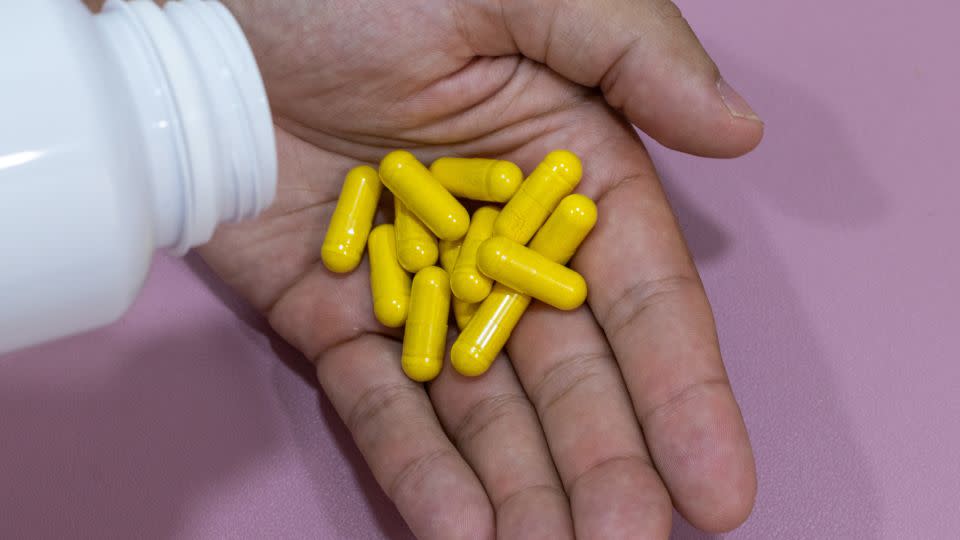Forget TikTok claims: ‘Nature’s Ozempic’ is no such thing, experts say
If TikTok and Reddit influencers are to be believed, the plant-based compound called berberine can be a replacement for such popular diabetes and weight loss drugs as Ozempic and Wegovy.
Using berberine as a supplement has become so trendy, in fact, that it has been dubbed “Nature’s Ozempic” by social media users. Some manufacturers are jumping on the trend.
“Berberine has become my new BFF because it has been helping me with my weight loss,” one believer gushed, adding that one of the herbal supplement’s manufacturers is offering her — and a few of her lucky viewers — a year’s supply.
Some medical experts CNN spoke with, however, had concerns about the use of this unregulated supplement. As an extract from plants such as goldenseal, barberry and various poppies, berberine is considered a dietary supplement by the US Food and Drug Administration and is thus regulated as a food, not a drug.
“That’s the problem with berberine and all of these herbal substances — they’re typically not rigorously studied in the type of large, randomized clinical trials that we put actual drugs through. So, you have to be very careful,” said Dr. Caroline Apovian, a professor of medicine at Harvard Medical School and codirector of the Center for Weight Management and Wellness at Brigham and Women’s Hospital in Boston.
“As for it being nature’s Ozempic, there’s no evidence to suggest that is true,” added Apovian, who was the lead author for the Endocrine Society’s clinical practice guidelines for the pharmacological management of obesity.
Is berberine’s weight loss effect meaningful?
That doesn’t mean that the herb has no impact at all on the body’s metabolic systems, however. A pooled meta-analysis of a number of small clinical studies on berberine’s impact on cardiovascular risk factors, including obesity, found a very small, but statistically significant weight loss benefit.
“But statistical significance does not mean clinically meaningful,” said Dr. Justin Ryder, a pediatric obesity researcher and associate professor of surgery and pediatrics at Northwestern University’s Feinberg School of Medicine in Chicago.
“What do I mean by that? On average across the studies, the pooled response was about a 0.25 reduction in body mass index or BMI compared to placebo,” he said. Body mass index is a measurement of a person’s body fat based on height and weight.
“For Ozempic and Wegovy, the decrease in BMI compared to placebo was 4.61 BMI units, or 18 times more effective than berberine, Ryder added. “So, does berberine have an effect? The data would suggest yes. Is the effect meaningful? Probably not.”
History of berberine
Some of the roughly 500 different species of plants that belong in the genius Berberis have been used for centuries in Ayurveda and traditional Chinese medicine to fight inflammation and heal wounds, cure constipation and hemorrhoids, and battle infections of the ear, eye, mouth and digestive tract.
“It’s part of the arsenal of herbs used by naturopathic doctors,” said Dr. Joshua Levitt, a naturopathic doctor in Hamden, Connecticut.
“When it comes to glycemic control and for regulation of cholesterol and other lipids and antimicrobial uses, there’s some cool stuff to be done with herbs and nutrients.”
In fact, the library of Assyrian emperor Ashurbanipal has clay tablets dating back to 650 BC stating the tangy fruit of the barberry plant was used as a blood-purifying agent.
“It’s usually used in its whole plant extract form — leaves, roots, bark all made into a tincture powder or something,” Levitt said.
Scientists were able to extract berberine as the active ingredient in these plants over 100 years ago, he said, and began to study the compound for metabolic issues such as cholesterol, diabetes and obesity.
Berberine may enhance the body’s natural production of GLP-1, or glucagon-like peptide 1, a gastrointestinal hormone that’s used in Ozempic and other new weight loss drugs. That’s how the compound “fits into this discussion. However, in terms of its weight loss benefits, they are modest at best,” he said.
Berberine’s possible side effects
Berberine can have side effects when mixed with other medications, including the medication metformin, which is often prescribed for people with diabetes and polycystic ovary syndrome and, more recently, for weight loss.
“Metformin lowers blood sugar, and berberine lowers blood sugar,” Levitt said. “And if you take two items that lower blood sugar at the same time, you could have a problem like excessive hypoglycemia, when blood sugar crashes.”

In addition, berberine is “directly antimicrobial,” which was its most common use in historical herbal medicine, Levitt said: “Antimicrobial effects can irritate the GI tract so unless a person has an overgrowth of bad bugs it can cause digestive distress.”
Berberine can be dangerous if taken with cyclosporine, an immunosuppressive drug used to treat organ rejection post-transplant, as it might heighten that drug’s effects and possible side effects. Another known interaction is with sedative drugs, as berberine can cause additional sleepiness and slowed breathing, according to the National Library of Medicine.
In addition, berberine should not be taken while pregnant or breastfeeding.
“Berberine can cross the placenta and might cause harm to the fetus. Kernicterus, a type of brain damage, has developed in newborn infants exposed to berberine,” the National Library of Medicine notes on its website.
For these reasons, it’s important to check with your doctor first if you’re considering taking berberine or any other unregulated supplement.
Despite research investigating the herb’s potential impact on diabetes, high cholesterol and heart disease, the FDA has “not yet approved berberine for any prescription or over-the-counter drug use, and it has sent notices of violation to companies that have made drug claims on their Web sites,” according to the American Chemical Society.
For more CNN news and newsletters create an account at CNN.com

